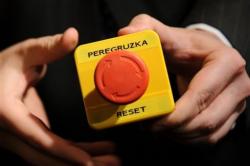
Back in January, I opined in this space that it was time to "Time to Retire the Russia Reset Button." With presidents Barack Obama and Dmitry Medvedev signing the follow-on START agreement in Prague today, should I re-evaluate that position? Any foreign policy commentator worth his salt should always be prepared to critically examine his predictions. So is the "reset" back on course?
To some extent, it is. And this is because some of the critical irritants in the U.S.-Russia relationship have diminished. Significantly, the election of Viktor Yanukovych as president of Ukraine immediately removed one of the biggest impediments. Ukraine is no longer expected to seek membership in the North Atlantic Treaty Organization.
And while the Obama administration continues to support Georgia’s westward aspirations, president Mikheil Saakashvili is viewed by the current team with a far more critical eye than its predecessors-and they have made clear that Tbilisi does not have a blank check from the United States.
Russia has become more accommodating on the question of Iran sanctions, in part because of intensive French diplomatic efforts. France has been willing to offer economic and security incentives to Russia on things that matter a great deal to the Kremlin; Moscow, in turn, is less interested in jeopardizing its blossoming relations with Nicolas Sarkozy (who, after all, was initially quite skeptical on Russia) by showing no flexibility on an issue that is important to his administration.
On arms control, one has to expect that recent technical setbacks, particularly with the Bulava missile, has taken the wind out of the sails of those around Prime Minister Vladimir Putin who argued that Russia did not need a new agreement with the United States. Modernization of the Russian nuclear force may prove to be more difficult and expensive than originally anticipated-so why not agree to a new set of binding limits with the United States?
The Obama team did change the tone of the Russian-American relationship, and its reset efforts have been helped by a series of fortuitous circumstances. But I continue to express caution; there are still some fundamental fault lines that lurk underneath the positive optics on display in Prague today.
Nikolas K. Gvosdev [email], an Atlantic Council contributing editor, is on the faculty of the U.S. Naval War College. The views expressed are his own and do not reflect those of the Navy or the U.S. government.
Image: reset-peregruzka.warsawbiopic.jpg
